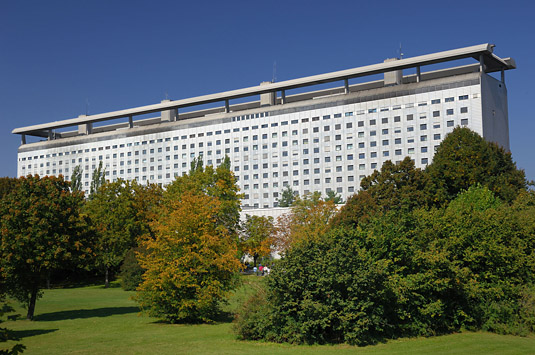Hospital of the Ludwig-Maximilians-University (LMU) Munich Großhadern
| Address | Marchioninistraße 15 81377 München Bayern Deutschland |
| Phone | +49 89 4400-0 |
| Website | www.klinikum.uni-muenchen.de |
| Region | Munich More from this region |
Especially in the fields of high-risk births and transplants, the clinic is considered one of Europe's best hospitals as well as one of the most innovative in Germany.
As a hospital of cutting-edge medicine, the University Hospital of Munich has 45 different individual clinics, departments and institutes and treats around 500,000 inpatients and outpatients annually.
The hospital of the Ludwig-Maximilians-University Munich is one of the top hospitals in Europe. With its two clinics in downtown and Grosshadern and its more than 2,000 beds and its affiliated institutions, the clinic is Germany’s second largest hospital after Charité in Berlin.
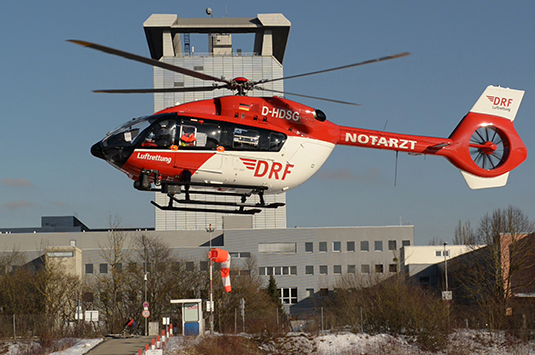
The University Hospital of Munich is one of the top hospitals in Europe. With its two clinics in downtown and Grosshadern and its approximately 2,300 beds and its affiliated institutions, the clinic is Germany’s second largest hospital after Charité in Berlin. As a hospital of maximum care level, it is also among the largest hospitals in Europe. As a research and teaching institution it is connected with the University of Munich.
As a hospital of cutting-edge medicine, the Ludwig-Maximilians-University (LMU) Munich has 45 different individual clinics, departments and institutes and treats around 500,000 inpatients and outpatients annually. Of its more than 9,800 employees, 1,800 are physicians, 3,400 in the care sector and 4,600 in the medical technology area, e.g. as medical technical assistant (MTA), medical technical radiology assistant (MTRA) or laboratory assistant.

Especially in the fields of high-risk births and transplants, the clinic is considered one of Europe's best hospitals as well as one of the most innovative in Germany. It is also one of Europe’s leading medical institutions in the fields of Alzheimer's disease, colon cancer, cardiology, lung cancer, multiple sclerosis, prostate cancer and radiotherapy. In the area of Alzheimer's disease, there is a close collaboration with the department of neurology and the German Center for Neurodegenerative Diseases (DZNE).
In May 2015, the Transplant Center of the University Hospital in Munich celebrated 30 years of liver transplants: The first transplant was carried out in August 1985. With these years of experience and 61 liver transplants in 2014 and a total of more than 1,000 transplanted livers, the transplant program of the Ludwig-Maximilians-University Munich belongs to the largest five centers in Germany.
In 2016/17, a new portal clinic shall be constructed on the site of the “Innenstadtklinikum” (downtown clinic) which will house, among other things, 200 additional beds utilised on an interdisciplinary basis, several ambulances, an emergency room and a private birth center.
The University Hospital of Munich with the two clinics in Grosshadern and the campus downtown has been an organizationally, fiscally and administratively independent part of the Ludwig-Maximilian University since 1999. As a center of cutting-edge medicine, innovation as well as medical and technical progress, the clinic takes up an important position among German and European university hospitals.
Especially the Dr. von Haunersches children's hospital (Dr. von Haunersches Kinderspital) and the gynecological hospital (Frauenklinik in der Maistraße) have had an excellent reputation as an innovative medical facility at the cutting edge of science for years.
Already in 1806, the University Hospital of Munich had a pioneering role when a new fan system for ventilation of the wards was built in for the first time in history of hospitals. This innovation even prompted Napoleon to visit. The fan system was an important contribution to hygiene development worldwide. In addition, the hospital was one of the first, which was able to offer its patients water flushed toilets.
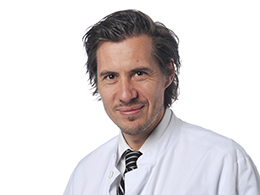
Polyklinik I
The clinic has had a 24-hour emergency phone for heart attack patients since November 2014. The "heart attack mobile" can be reached at the number +49 89 4400 5500 1. The executive senior physician at Polyclinic I, Prof. Dr. Axel Bauer, was honored by the German Society for Internal Medicine (DSIM) and the German Foundation Internal Medicine (DGIM) with the "Prevention Award 2015". Together with scientists, he had discovered a method by which one can assess better the risk of a sudden cardiac death. This new analysis method can especially help high-risk patients detect the risk of heart attacks at an early stage and treat preventively.

Cancer centers
The University Hospital of Munich is one of Germany's centers of excellence with respect to the care of cancer patients. The Comprehensive Cancer Center founded in 2013 is an oncological center certified by the German Cancer Society (DKG). It does research in this field in cooperation with the Klinikum rechts der Isar of the Munich Technical University. It bundles all therapeutic, scientific and technical education activities of the two Munich universities and the "Tumor Center Munich". 150,000 cancer patients are treated in the Comprehensive Cancer Center annually.
The both established centers are certified by the German Cancer Society Centers for breast and colon cancer at the University Hospital of Munich for their high-level oncology research, its high quality specifications and its optimization in patient care. The breast center has also introduced a certified quality management system in the fields of medical and nursing patient care and surgical techniques.
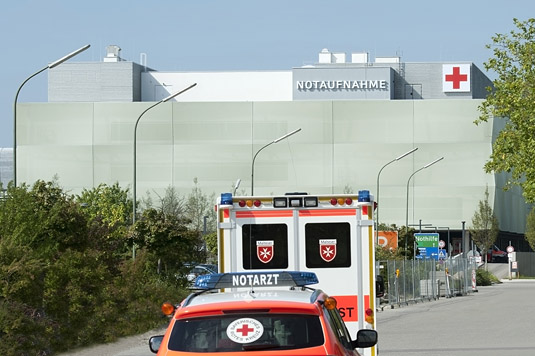
Pediatrics and pediatric cardiology
The University Hospital of Munich has had a separate department for pediatric cardiology and pediatric intensive care since 1992. These departments work closely together with the department of cardiac surgery, and have an excellent reputation due to their first-rate technical equipment, such as modern cardiac catheter facilities with reduced radiation for the diagnosis of congenital heart defects.
In the field of heart/lung transplantation in infancy and childhood, Grosshadern is one of the few transplant centers for children in Germany. With a total of more than 100 organ transplants, it has particularly great experience in this area. In addition, an own children's anesthesiology department ensures safe anesthesia in children, infants and premature babies.
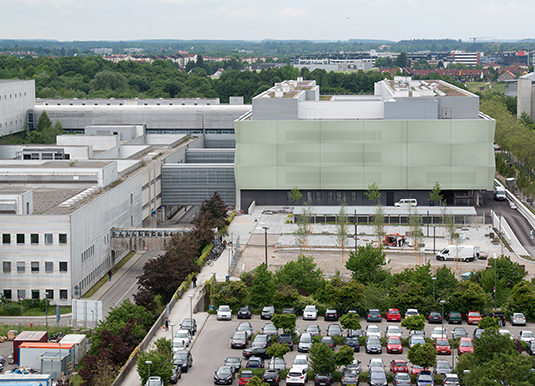
In the University Hospital of Munich, more than 3,000 people work in nursing service and functional units. This allows a round-the-clock care for all patients.
The infection prevention plays a central role regarding quality assurance in order to guarantee maximum patient safety. For this purpose, strategies to avoid infections are developed and revised on a regular basis.
Apart from the major hospital services, it is possible to take advantage of additional services at the University Hospital of Munich via an additional private health insurance, a private insurance or as a self-paying patient.
These include treatments by the physician of his/her choice, by the chief physician or accommodation in a modern single room. It is also possible to provide the patients with a private sanitary zone and an additional bed for an accompanying person.
Optional non-physician comfort services and comprehensive service packages are also part of service offer at the University Hospital Munich. These include a personal contact person, individual dietary requirements or expanded meals, daily towel and linen change, an exclusive cosmetic case, a wide range of daily newspapers and magazines as well as a laundry service.
Registered medical specializations

